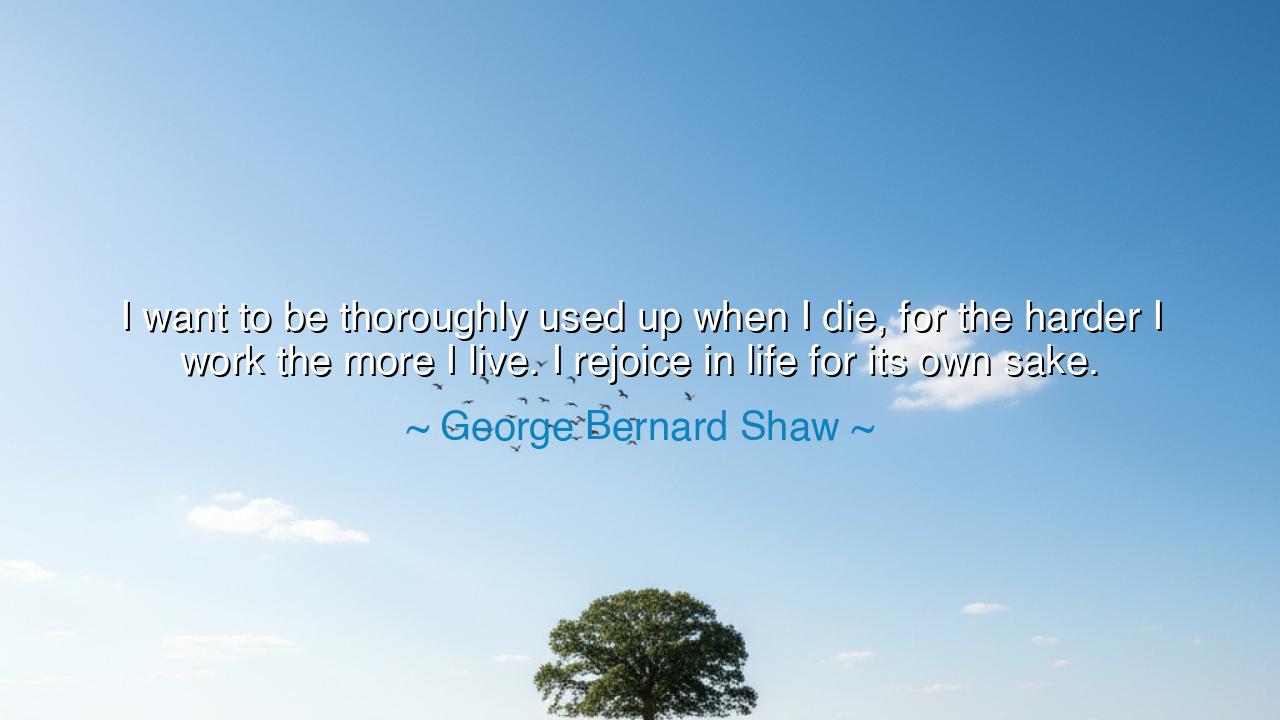
I want to be thoroughly used up when I die, for the harder I
I want to be thoroughly used up when I die, for the harder I work the more I live. I rejoice in life for its own sake.






When George Bernard Shaw proclaims, “I want to be thoroughly used up when I die, for the harder I work the more I live. I rejoice in life for its own sake,” he speaks not as a weary man but as a soul aflame. His words carry the vigor of one who sees existence as a sacred trust, not a treasure to hoard but a fire to pour out until nothing remains. In them lies the timeless exhortation: that our days are not given for idleness, but for purpose.
The origin of this thought flows from Shaw’s own relentless creativity and ceaseless labor. A writer, critic, and thinker, he did not drift through his years but hurled himself into them. By declaring his wish to be thoroughly used up, he rejects the timid approach to living and embraces the heroic — the ancient idea that a life well-lived is a life exhausted in service, creation, and striving for the good.
To say “the harder I work the more I live” is to overturn the common belief that labor drains vitality. Shaw suggests instead that effort is not the enemy of joy but its companion. In every act of creation, in every task embraced with passion, the soul discovers its strength. Thus, in his view, to shrink from effort is to shrink from life itself, while to labor deeply is to drink deeply of its sweetness.
His final cry, “I rejoice in life for its own sake,” speaks of a joy untainted by calculation. It is not the reward of work he seeks, nor applause, nor wealth, but the very experience of living fully. This is the ancient wisdom of the sages: that life is not a stepping stone to some distant prize but a gift whose worth lies in its immediate fullness.
Let future generations remember: the measure of existence is not in how long one breathes but in how fully one gives. To be used up in noble purpose, to work with one’s whole being, and to rejoice in life without waiting for reward — this is the path of the wise. Shaw’s words endure as a summons to spend ourselves bravely, leaving behind not a life preserved, but a life poured out and completed.






DPdungxx pham
I admire Shaw’s passion for life, but I wonder—how can we stay joyful and energetic through the hard work he suggests without losing sight of our emotional well-being? It’s easy to get caught up in the idea of living to the fullest, but how do we ensure that our efforts aren’t just about achieving more but also about being kind to ourselves along the way? Can we work hard and still take care of our mental health?
GB7a3.04.DAO NGUYEN GIA BAO
Shaw's perspective makes me reflect on what it means to live 'fully.' Is it about constant work, constant productivity, or is there room for moments of stillness, reflection, and simple enjoyment? The idea of being 'used up' by work seems to imply that living is only valuable if you're always doing something. But how do we reconcile this with the idea that peace and contentment often come from not always striving?
THtran thi heo
I absolutely agree with Shaw’s sentiment of finding joy in life for its own sake. But in today’s world, can we still rejoice in life when there’s so much pressure to achieve and perform? Does this quote suggest that the pursuit of achievement is the only way to fully experience life? What happens if someone finds fulfillment in less conventional, less 'hard-working' ways—do they miss out on the joy Shaw describes?
GDGold D.dragon
Shaw’s idea of 'the harder I work, the more I live' definitely challenges the conventional wisdom that life should be about balance and rest. How do we know when we’ve worked hard enough and have truly lived, instead of just being busy? Is working harder always synonymous with living more fully, or can there be value in slowing down to appreciate life in a different way?
PCThang Pham Cong
This quote inspires me, but I wonder—does living life this intensely sometimes lead to regrets or burnout later? Can we truly work ourselves to the point where we feel 'used up' and still have time to reflect on the meaning of it all? It seems like Shaw is encouraging us to be active and engaged, but can you still live fully without overexerting yourself, or is the pursuit of that kind of life all-consuming?